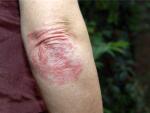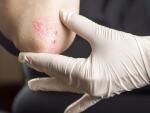
Many people are not familiar with psoriasis, and may ask you about it when they notice your psoriasis plaques. If you have children with psoriasis, you may want to prepare them to answer questions. After all, children often ask aloud what grown-ups just wonder about.
It's very normal for people to be curious, but sometimes curiosity can become intrusive. If you feel self-conscious when people ask about your psoriasis, you’re not alone. Think of the questions as an opportunity to educate people who may have misconceptions about your condition.
Here are suggestions on how you might answer common questions.
1. What is psoriasis? Psoriasis appears to be a genetic disorder associated with the immune system. With psoriasis, skin cells reproduce more quickly. Instead of being shed normally, they collect on the skin surface.
2. Is psoriasis contagious? Many people may wonder about this, especially if they are in a public pool. Let people know that even though psoriasis plaques may resemble a rash, psoriasis is not contagious, it does not contaminate pool water, and it cannot be spread in the air like a virus or even by skin-to-skin contact.
3. How did you get psoriasis? Because psoriasis is not contagious, it’s easy to wonder why one person gets it and another doesn’t. Explain that scientists don’t know the answer to that question yet. Since there appears to be a genetic link, it’s likely that the tendency to develop it is passed down from one generation to another.
4. Will your psoriasis get better? Psoriasis is a chronic condition, which means it will last throughout your lifetime. But it’s also a condition that can get better and disappear, or go into remission for months or even years at a time. Unfortunately, psoriasis can also get worse. Explain that you can experience a flare-up at any time and that you have specialized treatments to get these episodes under control.
5. Will psoriasis shorten your life? People with psoriasis appear to live as long as people who do not have it.
6. Is psoriasis a rare disease? Though many people don’t know about psoriasis, it is rather common. In fact, more than 150,000 new cases are diagnosed every year, and about 7.5 million Americans are living with psoriasis.
7. Can you be intimate when you have psoriasis? The answer to this question is yes, but some people with psoriasis may not feel this way. In fact, in a study by the National Psoriasis Foundation, 35% of respondents said they limited dating or intimate interactions because of psoriasis. If you have psoriasis, it’s important not to isolate yourself. You may feel like your psoriasis is an obstacle in relationships, but as you explain that it’s not contagious, remind yourself of this as well.
8. Is there a cure for psoriasis? Because scientists don’t know exactly what causes psoriasis, there is no cure for it yet. On a positive note, there are many promising avenues of research and very effective treatments.





























